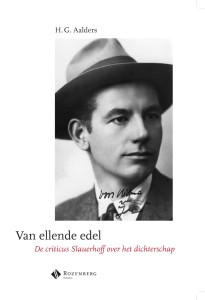Van ellende edel ~ Bibliografie
 Abrams, M.H. – 1953 The Mirror and the Lamp. Romantic Theory and the Critical Tradition. Oxford University Press. Londen / Oxford / New York.
Abrams, M.H. – 1953 The Mirror and the Lamp. Romantic Theory and the Critical Tradition. Oxford University Press. Londen / Oxford / New York.
Akker, W.J. van den – 1984 ‘En marche vers le ciel. Over “Het lied der dwaze bijen”’. In: De revisor 11 (1984) 4 (aug): 72–79,85.
Akker, W.J. van den – 1985 Een dichter schreit niet. Over de versexterne poëtica van M. Nijhoff. 2 dln. Proefschrift Utrecht. Veen. Utrecht.
Akker, W.J. van den – 1987 ‘De schrijver in een impasse; over “De schrijver” van M. Nijhoff (I)’. In: De nieuwe taalgids 80 (1987) no. 5: 386–406.
Akker, W.J. van den en G.J. Dorleijn – 1985 ‘Stemmen uit de redactie. Een documentatie over het redactiebeleid van De gids tussen 1916 en 1926’. In: W.J. van den Akker e.a. (red.), Traditie en vernieuwing. Opstellen aangeboden aan A.L. Sötemann. Veen. Utrecht / Antwerpen: 146–177.
Anbeek, T. – 1996 Het donkere hart. Romantische obsessies in de moderne Nederlandstalige literatuur. Amsterdam University Press. Amsterdam.
Anbeek, T. – 1999 Geschiedenis van de literatuur in Nederland, 1885–1985. Arbeiderspers. Amsterdam / Antwerpen. 5de, herz. dr. (1ste dr. 1990).
Bai Juyi – 2001 Gedichten en proza. Vertaling en toelichting W.L. Idema. Atlas. Amsterdam / Antwerpen.
Bakker, S. – 2002 ‘J. Slauerhoff’. In: A. Zuiderent, H. Brems en T. van Deel (red.), Kritisch lexicon van de moderne Nederlandstalige literatuur. 86ste aanv., aug.
Baudelaire, Ch. – 1976 O’Euvres complètes II. Éd. C. Pichois. Gallimard. Parijs. Bibliothèque de la Pléiade no. 7].
Baudelaire, Ch. – 1995 De bloemen van het kwaad. Vertaling en commentaar P. Verstegen. Van Oorschot. Amsterdam [Franse bibliotheek – klassiek]. Tweetalige uitgave (integrale vertaling van de 2de druk van Les Fleurs du mal. Poulet-Malassis et De Broise. Parijs 1861)
Bergh, Hans van den – 2002 ‘Paul Verlaine – voorvechter van het symbolisme?’. In: De tweede ronde 23 (2002) 3 (herfst): 91–99 [Verlaine-nummer].
Bergh, Herman van den – 1918 ‘Studiën (tweede reeks) VI: Van grondslag en onderscheid’. In: Het getij 3 (1918): 192–196. Ook in: idem, Nieuwe tucht. Studiën over litteratuur. De Spieghel. Amsterdam z.j. [1928]: 7–13. Read more
De wereld draait door ~ Van Dis en Meinderts over de nalatenschap van Slauerhoff (April 2014)
Het Letterkundig Museum in Den Haag bemachtigde de literaire nalatenschap van zwervend dichter en schrijver J.J. Slauerhoff. Adriaan van Dis en museumdirecteur Aad Meinderts lichtten toe wat er in de kist en vijftig dozen werd aangetroffen.
VARA ~ De wereld draait door ~ april 2014
Mara Forbes, Ariana MacPherson & Noah Schermbrucker – City Finance That Works For And With The Poor
The global economic system is inherently unequal and the poor bear the full brunt of this nequality. In other words, the way finance flows and the systems that perpetuate resource distribution are inherently weighted against inclusion of the poor. Banks do not supply loans on terms affordable to slum dwellers, cities sink budgets into formal taxpaying areas rather than slums while policies, rules and regulations prop up a grossly uneven distribution of wealth. Traditional market finance does not, and in all likelihood cannot, work for the poor on a city scale – slums continue to grow, as does the gap between rich and poor, north and south. The problem is not poor people’s inability to access the global economy but the formal global economy’s inability to provide solutions that are flexible enough to include the poor.
Read more (PDF-format): http://www.sdinet.org/media/CityFundsReport_SDI_032014.pdf
Urban Think Tank Introduces The Empower Shack To The Slums Of Western Cape
designboom.com. March 8, 2104. international studio urban think tank led by alfredo brillembourg and hubert klumpner are currently exhibiting the ‘empower shack‘ at the galerie eva presenhuber in zurich. the project is developed as an adapting response to urban informality, offering not only improved housing but a strategy that allows the citizens of self-built urban communities to dynamically structure their urban environment as an instant response to their needs. the empower shack was a largely collaborative project between U-TT, south african NGO Ikhayalami (‘my home’), transsolar, brillembourg ochoa foundation, meyer burger, the BLOCK ETH ITA research group, and videocompany. over the course of extensive research and close communication with community leader phumezo tsibanto, a prototype was developed featuring a two story metal-clad modular wood frame structure that is economical for the residents and can be self-built. jumping back in scale, the project also features a master plan that begins to structure informally developed neighborhoods to include courtyards, public space, and improved circulation through a ‘blocking out’ system.
read & see more: http://www.designboom.com/slums-western-cape
University of Witswatersrand – Publications Archive / Housing Bibliography
The Housing Bibliography has been produced to cover a wide range of housing-related literature, e.g. housing policy, housing finance, social housing, informal settlements.
The material has been divided into two phases:
1) Up to 1999; and
2) 1999 – 2003.
Read more: http://www.wits.ac.za/publications_archive.html
ISSA Proceedings 2006 – Ehninger’s Argument Violin
 Douglas Ehninger’s theoretical gem, “Argument as Method” (1970), introduces us to two unsavory debate characters. First, there is the “neutralist” – an interlocutor who eschews commitment at every turn. Following the Greek philosopher Pyrrho, the neutralist thinks that since nothing can be known, standpoints should float freely, unanchored by the tethers of belief. The neutralist’s counterpart is the “naked persuader” – someone who approaches argument like Plato’s Callicles – clinging doggedly to preconceived beliefs and resisting any shift no matter how compelling the counterpoints (Ehninger 1970, p. 104).
Douglas Ehninger’s theoretical gem, “Argument as Method” (1970), introduces us to two unsavory debate characters. First, there is the “neutralist” – an interlocutor who eschews commitment at every turn. Following the Greek philosopher Pyrrho, the neutralist thinks that since nothing can be known, standpoints should float freely, unanchored by the tethers of belief. The neutralist’s counterpart is the “naked persuader” – someone who approaches argument like Plato’s Callicles – clinging doggedly to preconceived beliefs and resisting any shift no matter how compelling the counterpoints (Ehninger 1970, p. 104).
Naked persuaders and neutralists each have difficulty engaging in argument, but for different reasons. According to Ehninger (1970, p. 104), argumentation is a “person risking enterprise,” and by entering into an argument, “a disputant opens the possibility that as a result of the interchange he too may be persuaded of his opponent’s view, or, failing that, at least may be forced to make major alterations in his own.” In this account, naked persuaders are hamstrung by their unwillingness to risk the possibility that the force of reason will prompt alteration of their views. Neutralists, on the other hand, prevent the “person risking enterprise” from ever getting off the ground in the first place, since they place nothing on the table to risk.
Ehninger’s unsavory characters illustrate how the concept of standpoint commitment has salience in any theory of “argument as process” (Wenzel 1990). To reap the full benefits of the process of argumentation, interlocutors must adopt stances vis-à-vis their standpoints that strike an appropriate balance between perspectives of the naked persuader and the neutralist. For Ehninger (1970, p. 104), such a balanced posture consists of “restrained partisanship,” where advocates drive dialectic forward with tentative conviction, while remaining open to the possibility that the course of argument may dictate that their initial standpoints require amendment or retraction. Finding this delicate balance resembles the tuning of violin strings – a metaphor that underscores his point that the proper stance of restrained partisanship must be tailored to fit each situation.
The public argument prior to the 2003 Iraq War offers a clear example of a poorly tuned deliberative exchange. While several official investigations (e.g. US Commission 2005; US Senate 2004) have explained the breakdown in prewar decision-making as a case of faulty data driving bad policy, this paper explores how the technical concept of foreign policy “intelligence failure” (Matthias 2001) can be expanded to offer a more fine-grained explanation for the ill-fated war decision, which stemmed in part from a failure of the argumentative process in public spheres of deliberation. Part one revisits Ehninger’s concept of standpoint commitment, framing it in light of related argumentation theories that address similar aspects of the argumentative process. This discussion paves the way for a case study of public argument concerning the run-up to the 2003 Iraq War. Finally, possible implications of the case study for foreign policy rhetoric and argumentation theory are considered. Read more




